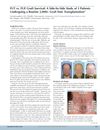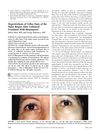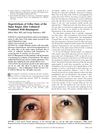 1 citations,
January 2021 in “Journal of Cancer Therapy”
1 citations,
January 2021 in “Journal of Cancer Therapy” Regenerative medicine may help reduce radiotherapy side effects like skin cancer, fibrosis, pain, and hair loss.
[object Object]  June 2011 in “Faculty Opinions – Post-Publication Peer Review of the Biomedical Literature”
June 2011 in “Faculty Opinions – Post-Publication Peer Review of the Biomedical Literature” Finasteride, a hair loss drug, can cause long-lasting sexual side effects like low libido and erectile dysfunction.
 13 citations,
September 2018 in “Hair transplant forum international”
13 citations,
September 2018 in “Hair transplant forum international” FUE and FUT hair transplants have similar success rates, with FUE slightly better.

Coconut oil can damage hair by clogging pores, causing frizz, and disrupting moisture balance.
21 citations,
January 2007 in “Journal of Drugs in Dermatology” The laser effectively removes hair for skin types IV and V but is less effective for type VI.
 July 2024 in “Journal of the American Academy of Dermatology”
July 2024 in “Journal of the American Academy of Dermatology” Low-dose oral minoxidil is generally safe for hypertensive patients with hair loss.
 41 citations,
July 2015 in “Current Drug Discovery Technologies”
41 citations,
July 2015 in “Current Drug Discovery Technologies” Some plants may help with hair growth and have fewer side effects than synthetic drugs, but more research is needed to confirm their effectiveness.
 5 citations,
August 2018 in “Neurology and Therapy”
5 citations,
August 2018 in “Neurology and Therapy” Hair thinning is a common but generally mild and reversible side effect of teriflunomide in multiple sclerosis patients.
 2 citations,
October 2016
2 citations,
October 2016 Chemotherapy and radiotherapy can cause skin side effects like rashes, hair loss, and nail changes, which are usually managed with conservative treatments.
 August 2024 in “Journal of Aesthetic Nursing”
August 2024 in “Journal of Aesthetic Nursing” New non-surgical treatments for hair loss show promising results with fewer side effects.

10% minoxidil improves frontal hair count more than 5% but has more side effects.

Teprotumumab for thyroid eye disease commonly causes fatigue, brittle nails, dry eyes, hair loss, muscle spasms, and dry mouth, with rare serious events like blood clots.

Scalp tonics are popular for stress-related hair loss, but minoxidil is used less due to side effects and inconvenience.
May 2023 in “Hair transplant forum international” Oral minoxidil shows promise for hair growth but needs more research on dosing and side effects.
January 2021 in “Journal of clinical & experimental dermatology research” The new 5% minoxidil formulation without propylene glycol effectively promotes hair growth with fewer side effects and better user satisfaction.
September 2022 in “Journal of The American Academy of Dermatology” Addressing concerns about side effects, cost, and long-term use could improve minoxidil treatment adherence.
 187 citations,
June 1999 in “Journal of The American Academy of Dermatology”
187 citations,
June 1999 in “Journal of The American Academy of Dermatology” Finasteride effectively treats frontal hair loss with few side effects.
 61 citations,
April 2014 in “The Journal of Steroid Biochemistry and Molecular Biology”
61 citations,
April 2014 in “The Journal of Steroid Biochemistry and Molecular Biology” Finasteride affects brain and blood steroids, causing lasting sexual and emotional side effects.
 55 citations,
November 2004 in “Expert opinion on drug safety”
55 citations,
November 2004 in “Expert opinion on drug safety” Chemotherapy often causes hair loss, nail changes, and mouth issues, but these are usually manageable.
46 citations,
December 2014 in “Epilepsy & behavior” Some antiepileptic drugs can cause weight gain and hair loss, especially in women.
 41 citations,
February 1970 in “Archives of Dermatology”
41 citations,
February 1970 in “Archives of Dermatology” Oral contraceptives can cause skin issues like dark patches, acne, yeast infections, sensitivity to light, spider veins, skin rashes, and hair loss.
 23 citations,
April 2004 in “American Journal of Ophthalmology”
23 citations,
April 2004 in “American Journal of Ophthalmology” Using bimatoprost on one side of the face caused increased cheek hair growth in a patient.
 18 citations,
April 2013 in “Inflammatory Bowel Diseases”
18 citations,
April 2013 in “Inflammatory Bowel Diseases” People with Inflammatory Bowel Disease often lose hair due to stress, medication side effects, or lack of nutrients, and treatment depends on the specific cause.
[object Object]  15 citations,
March 2004 in “American Journal of Ophthalmology”
15 citations,
March 2004 in “American Journal of Ophthalmology” Using bimatoprost on one side of the face caused increased cheek hair growth in a patient.
 14 citations,
March 2007 in “Pediatric pulmonology”
14 citations,
March 2007 in “Pediatric pulmonology” Inhaled steroids in children may cause excessive hair growth and not always go away after stopping the medication.
11 citations,
December 2017 in “Journal of the American Academy of Dermatology” The levonorgestrel intrauterine device for heavy periods may cause acne, hair loss, and excess hair growth.
 9 citations,
February 1996 in “Lancet”
9 citations,
February 1996 in “Lancet” Some tuberculosis drugs may cause hair loss, but hair might regrow after treatment or changing the drugs.
 7 citations,
June 2020 in “Translational Andrology and Urology”
7 citations,
June 2020 in “Translational Andrology and Urology” Finasteride for hair loss may cause lasting sexual, genitourinary, mental, and anti-androgenic side effects in young men.
 2 citations,
March 2015 in “Clinical and Experimental Dermatology”
2 citations,
March 2015 in “Clinical and Experimental Dermatology” Azathioprine can cause unusual hair loss, which may reverse after stopping the drug.
1 citations,
October 2019 in “Epileptic disorders” A girl with Pitt-Hopkins syndrome developed curly hair as a rare side effect from the epilepsy drug perampanel.






















